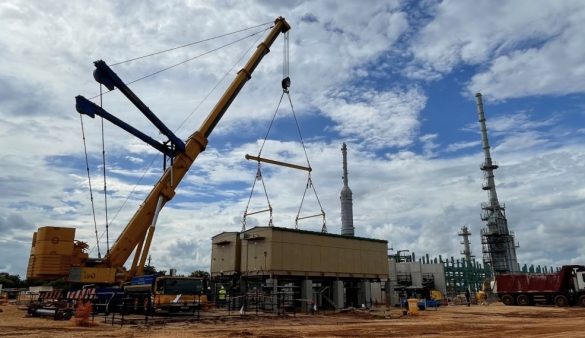WEG Africa, a prominent electrical equipment manufacturer, has successfully completed a sophisticated substation E-house for Sasol’s Upstream Production Sharing Agreement (PSA) project in Mozambique. The E-house, a crucial component of this large-scale energy project, includes distribution transformers and a diesel generator set. This comprehensive solution was developed in partnership with local engineering firm Proconics and was procured by engineering, procurement, and construction management (EPCM) contractor Wood.
Sasol’s PSA project is a significant undertaking, expected to produce 23 million gigajoules of gas annually. This gas will be essential for powering the Temane thermal power plant, which will generate 450 megawatts of electricity. Additionally, the project will deliver surplus gas for export, contributing to Mozambique’s energy sector. The project also includes a liquefied petroleum gas (LPG) facility, which is set to produce 30,000 tons per year. This production will meet 75% of Mozambique’s cooking gas demand, with additional light oil being produced for export.
Given the challenging environmental conditions in the region, including the risk of hurricanes, the E-house was designed to withstand extreme weather and other site-specific risks. Lukas Barnard, WEG Africa’s Oil and Gas business development sector specialist, highlighted the rigorous design standards applied to ensure the facility’s durability. Special treatment of the steel was necessary to achieve the high level of corrosion protection required for such a harsh environment. The work was conducted in strict accordance with national standard SANS 12944 for C5M environments, which are known for their high corrosivity.
The substation E-house’s construction features 3CR12 stainless steel for the outer walls, offering excellent resistance to corrosion. Additionally, galvanized steel was used for the outside staircases and walkways to further enhance durability. The structure is also engineered to resist seismic events, with the ability to endure ground acceleration of up to 0.2 g. These design elements ensure the E-house can operate safely and efficiently, even under the most challenging conditions.
The E-house, which measures 45 meters by 22 meters, houses medium-voltage and low-voltage switchgear, a battery room, a local equipment room, and a heating, ventilation, and cooling (HVAC) system. This compact yet comprehensive package overcomes the logistical and infrastructural challenges often encountered in building conventional electrical facilities in remote or underdeveloped areas.
WEG Africa’s decision to manufacture and pre-assemble the E-house units under controlled workshop conditions in Heidelberg, Gauteng, played a crucial role in ensuring the project’s success. Barnard explained that constructing the units in a controlled environment allowed for strict adherence to WEG Africa’s manufacturing quality standards, which align with the international standards ISO 9001. This approach also led to greater manufacturing efficiency, reducing the number of personnel needed on-site and thereby enhancing safety and minimizing the risk of construction-related incidents.
The pre-assembled E-house units were transported to the project site, despite the logistical challenges involved. This method significantly reduced the complexity and timeline of the installation process, as all the equipment had already been installed and tested before arriving on-site. This streamlined approach not only saved time but also ensured that the installation was carried out with minimal disruption and maximum efficiency.
Barnard emphasized the importance of the E-house in the overall PSA project, describing it as the “electrical heart” of the operation. The entire electrical supply and control for the PSA plant are managed through the E-house, making it a critical component for the project’s success. The collaboration between WEG Africa and Proconics, alongside the EPCM contractor Wood, exemplified the strength of their partnership. Together, they delivered a turnkey solution that met all client expectations, ensuring the highest quality of workmanship throughout the project.
The successful completion of this project sends a strong message about the capabilities and expertise available within South Africa’s industrial sector. It highlights the country’s ability to deliver high-quality, complex solutions for the oil and gas industry, reinforcing its position as a key player in the global market



